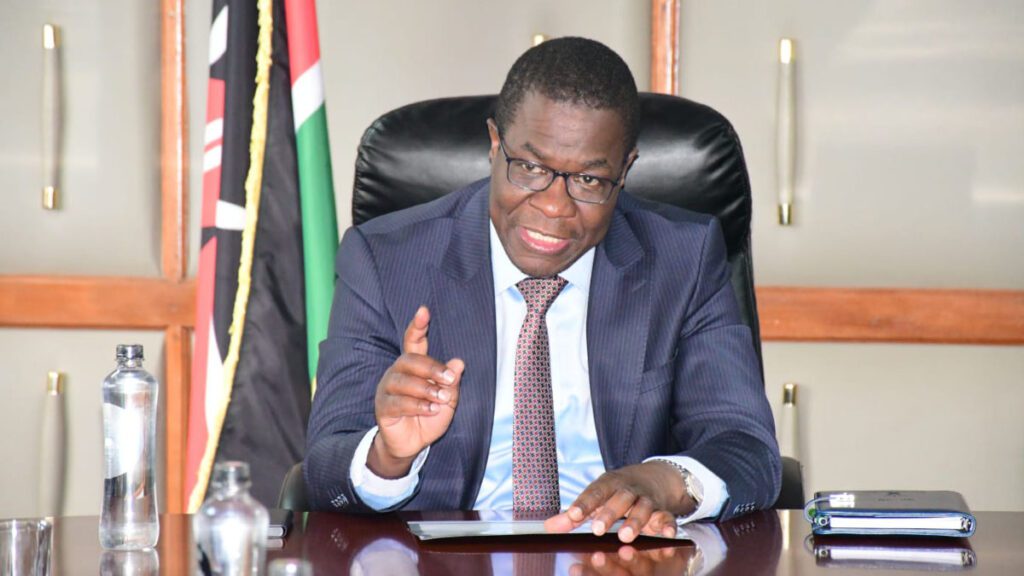Energy and Petroleum Cabinet Secretary Opiyo Wandayi has come out strongly against Kiharu MP Ndindi Nyoro’s criticism of the government’s handling of fuel prices, saying the lawmaker’s remarks are misleading and disregard global economic realities.
Speaking on Thursday, July 17, 2025, during the commissioning of rural electrification projects in Kajiado West sub-county, Wandayi blamed the recent fuel price hike on geopolitical tensions between Iran and Israel, which he says have caused a ripple effect across global oil markets.
“Rafiki yangu Ndindi Nyoro Mbunge wa Kiharu ameanza kuharibika kwa sababu anatoa matamshi ambayo haina maana,” Wandayi said in Kiswahili. “Vita kati ya Iran na Israel ndio imesababisha bei ya mafuta dunia mzima iende juu kidogo, ndiposa sisi hapa Kenya tukapata nyongeza kidogo ya bei wiki iliyopita.”
The CS added that Kenya’s fuel prices remain competitive compared to other developing African nations with similar economic standing.
“Wenye wanapiga kelele wamekuwa kimya wakati bei ya mafuta inashuka. Tukilinganisha bei ya mafuta Kenya na zile nchi za Afrika ambazo ziko kiwango ya Kenya kimaendeleo, bei yetu ya mafuta bado iko chini,” he said.
Electricity Prices Won’t Rise
Wandayi also dismissed speculation that the rising fuel prices would translate into higher electricity bills, saying the cost of power in Kenya has been on a downward trend for two decades.
“Ile uvumi ambayo watu wengine wanaeneza ya kwamba bei ya stima inapanda, hiyo ni porojo. Bei ya stima imekuwa ikishuka katika hii nchi for the last 20 years na wakati inashuka hawaongei,” Wandayi asserted.
His comments aimed to calm growing public concern about the rising cost of living, especially after last week’s upward adjustment of fuel pump prices.
Ndindi Nyoro Blames Government Taxes
But Ndindi Nyoro, the influential Kiharu legislator and Budget Committee chair, sees it differently. Speaking earlier the same day, Nyoro attributed Kenya’s high fuel prices not to global conflicts but to excessive government taxation.
“The current price of petrol is Ksh186. If you cross the border to Tanzania, petrol prices are Ksh142; Uganda is below Ksh180; Ethiopia, the current price is below Ksh125; and Rwanda is below Ksh170,” Nyoro said.
He argued that the difference lies in domestic taxation and policy, not external factors, and cited the government’s introduction of a Ksh7 levy as a key contributor to Kenya’s fuel price woes.
“That is why when global oil prices went down, Kenya never noticed. It’s because that was exactly when the levy was introduced,” he said.
Public Frustration Mounting
The exchange reflects growing frustration among Kenyans as the cost of living continues to rise. The Energy and Petroleum Regulatory Authority (EPRA) announced last week that petrol now retails at Ksh186.24 per litre in Nairobi, with diesel and kerosene prices also increasing.
Analysts say the back-and-forth between the CS and the MP signals deeper cracks within the ruling alliance, with the fuel price debate becoming a proxy for larger questions about tax policy, fiscal priorities, and government transparency.
While Wandayi maintains that international conflict is to blame and that Kenya’s pricing remains relatively fair, Nyoro’s regional comparison—and his call to review domestic levies—has struck a chord with many Kenyans, especially on social media.
As prices continue to strain household budgets, both leaders face mounting pressure to offer clear solutions rather than blame games. Whether the government will review its taxation policy remains unclear, but the political heat around the pump price issue is unlikely to cool down any time soon.


